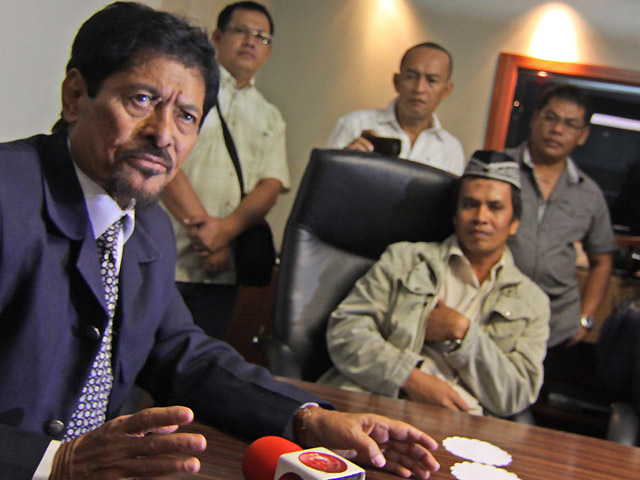Filtered By: Topstories
News
Endgame for aging rebel leader Nur Misuari?
By CECIL MORELLA, Agence France-Presse
Nur Misuari, a charismatic Muslim leader who set the Philippines' south ablaze with rebellion decades ago, is back doing what he does best after a less-than-successful fling with peace.
At the age of 71, the former academic is orchestrating a stand-off in the southern port city of Zamboanga that has claimed more than 100 lives and put him back in the national spotlight.
"We don't want to be part of the Philippines anymore," Misuari told supporters in his Jolo island stronghold on August 12 as he declared himself the president of the "Bangsamoro Republik" and railed against national government authorities.
"Their presence in our homeland is illegal, unlawful, illicit. They should pack up and leave."
A firebrand orator from an influential clan of the Tausug, a warrior-like seafaring tribe, Misuari rallied thousands of fellow Muslims in the early 1970s to take up arms for a separate state in the southern Philippines.
He was continuing a tradition for Muslims in the south of the mostly Catholic Philippines who had for centuries resisted outside Christian rule – whether that be Spanish, American or Filipino. 

In this October 2012 file photo, former ARMM Gov. and MNLF Chairman Nur Misuari (left) voices opposition to the PHL-MILF Bangsamoro Framework Agreement. Photo by Danny Pata.
Misuari was a young political science professor at Manila's prestigious University of the Philippines when he established the Moro National Liberation Front (MNLF) to launch a war for independence.
The conflict, which eventually took on other forms with the emergence of other rebel groups, has gone on to claim about 150,000 lives.
Misuari went into Middle East exile after a 1976 truce, then returned a decade later following the fall of dictator Ferdinand Marcos to begin negotiations with democratic governments in Manila.
He eventually agreed to a peace pact in 1996, with the MNLF laying down its arms in return for self-rule in parts of the southern Philippines and Misuari as the autonomous region's governor.
Political life less successful
But life for Misuari as a bureaucrat and politician would prove to be far less successful than as a revolutionary leader.
As head of the Autonomous Region in Muslim Mindanao (ARMM), he was finally in a position to help alleviate devastating poverty, corruption and violence in the south, and work to end the oppression that the millions of Muslims there feel.
Instead, he established a reputation among the political elite, the national media, and some Muslims as an aloof administrator who was more concerned about his own interests.
They argue he wasted the hundreds of millions of dollars in development funds he controlled.
"Some say he blew his chance, that he did not perform well, that he did not deliver, that he failed his people," Jesus Dureza, who advised two past Philippine presidents on Muslim issues, told AFP.
The governor was notorious for spending most of his time away, including weeks at a time with a large retinue at plush Manila hotels or on Middle East tours, said Ramon Casiple, executive director of the Manila-based Institute for Political and Electoral Reform.
Nevertheless, Misuari undoubtedly retains some support and influence.
"Nur is still an icon to some Muslims," Dureza said.
He and Casiple said Misuari was still able to tap into powerful emotions among many Muslims in the south of feeling oppressed and their dreams of independence.
His status as the founder of the rebellion would also always ensure respect.
However, they said many also realize that Misuari's motives for instigating the Zamboanga crisis may be driven more by personal interest and a fear of becoming politically irrelevant.
He sent an estimated 200 gunmen to Zamboanga in an effort to derail a planned peace deal with the region's remaining major Muslim rebel group, the 12,000-strong Moro Islamic Liberation Front, which split from the MNLF in 1978.
Under the envisaged peace pact, a new autonomous region largely controlled by the MILF would replace the MNLF-brokered one.
"They fear that they might be outside the mosquito net," Dureza said of the MNLF leadership, using a Filipino expression for total exclusion.
However, Misuari may have overplayed his hand, according to Casiple, citing his inability to draw much support beyond the Tausug heartlands of Jolo and Basilan island.
"His problem now is that you have a president who is in no mood to negotiate," Casiple said, citing President Benigno Aquino III's rejection of a ceasefire offer by Misuari and plans to charge his men with rebellion.
"I think this is the endgame for him." – Agence France-Presse
More Videos
Most Popular



